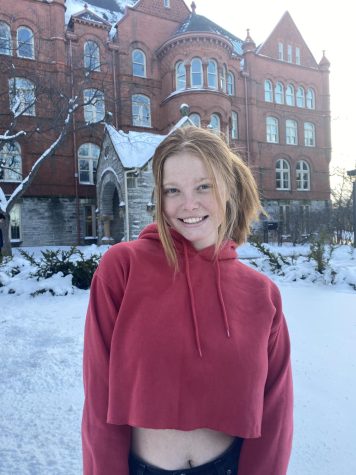Macalester hosts ninth annual critical theory symposium

April 28, 2022
Last Friday, April 22, affiliates of Macalester’s critical theory concentration crowded into the John B. Davis lecture hall to attend the ninth annual Critical Theory Symposium — an event that had not taken place in person for the past two years.
In a break from tradition, this year’s symposium consisted of six short, experimental talks, all of which related to various aspects of the COVID-19 pandemic. Previously, the symposium had invited two speakers from the critical theory concentration to give longer, more formal talks.
The critical theory concentration is one of ten concentrations offered at Macalester. To concentrate in critical theory, a student must take five courses which are listed under the critical theory concentration. These courses span a wide range of majors, especially those in the arts, humanities and social sciences. The symposium this year was sponsored by 11 different departments.
“People’s attention spans, given the strains of life on all levels, are a bit shorter,” Director of the critical theory concentration and international studies and English professor David Chioni Moore said. “Additionally, the pandemic has so many facets that we thought we’d be better served hearing five or six different perspectives.”
This year, Moore’s symposium topic was called “Who Needs Foucault’s Panopticon When You’re On Zoom?”
The overarching “pandemic” theme was underscored by the fact that this symposium had not taken place in person since 2019. In the spring of 2020, the symposium was canceled, and in 2021, the conversation took place on Zoom.
“The rare first-year student who, in 2019, attended the symposium would now be a senior,” Moore said in the symposium’s opening remarks. “We’re really delighted to be back in person.”
Moore also serves on a six-person steering committee, in which members are always the first to be asked to speak at the symposium. This year, however, the committee decided to reach out to other associates of the department.
Assistant philosophy professor Hannah Kim delivered a talk at the symposium called “Eternal Recurrence and COVID Time.” Kim drew on her memories of the first few weeks of the pandemic when considering what to speak on.
“For me, it was an exercise of remembering and connecting the early COVID experience to some of the philosophical topics I think about,” Kim said. “I saw it as a kind of personal nonfiction.”
This is Kim’s first year teaching at Macalester. In addition to younger faculty members, the critical theory concentration also asked seniors to speak. One senior, Aram Kavoossi ’22, agreed to present his talk, “Audio Virology and Affect Contagion.” This was the first symposium in which a student was also included in the conversation.
Although this year’s symposium was markedly different from previous years, the event was followed by a dinner catered by It’s Greek to Me, an ongoing tradition since the first year of the symposium.
An engaged Q&A session followed the six talks. Moore predicts that future symposiums will follow the less formal, experimental format of this year’s session.
“We were very pleased with the engagement we got in the Q&A, and it continued into dinner,” Moore said. “A lot of great conversations happen over meals. And everyone’s had a million thoughts about the pandemic.”











